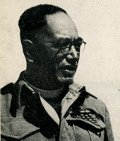
Padre Capt Kahi Takimoana Harawira speaks from Libya 1941. He gives a brief update of the Māori Battalion's activities during November 1941 in Libya noting the death of Capt Parekura Tureia who was OC of C Company. Both men were veterans of the First World War and considered pakeke (elders) in the Maori Battalion.
This recording is part two of a fuller broadcast made by the Māori Battalion about the Libyan campaign and was primarily directed at the Battalions' people at home in New Zealand.
[Editors note - there is intermittent static throughout the sound file]
Transcript
[Macrons are not shown as users have the advantage of listening to the recording to see which vowels require emphasis.]
Ki nga iwi, ki nga reo, ki nga rangatiratanga e noho mai ra i nga marae o Aotearoa, te Waipounamu, tena koutou. Ko nga morehu enei o te Hokowhitu a Tu i waimarie ki te puta mai i te mura o te ahi o Ripia e mihi atu nei ki a koutou. Tena ra koutou i a Parekura Tureia me tana whanau e tiraha mai ra i runga i nga marae o Ripia. Tena ano hoki koutou i nga aitua o te kainga. Haere huihui atu koutou i kona i konei. Katahi tonu matou ka hoki mai. No tekau ma tahi o nga ra o Noema i hikoi atu ai o matou waewae ki roto i te rohe o te hoariri. No te rua tekau ma toru o nga ra ka piri te whanau i nga taua a Hitara raua ko Mussolini ki runga ki nga parepare o Sollum. No te kokiri tuatahi tonu, ka hinga tera o matou pakeke a Parekura. I hinga rangatira, i hinga toa, i te wa e arahi ana i tana iwi a Ngati Porou. Ka noho pani era o a matou tamariki. No reira, ka karangatia atu tenei o a koutou tamariki a Captain Charles M. Bennett hei kaiarahi i a ratou. A, nana a Ngati Porou i arahi tae noa ki te mutunga o tenei pakanga. Tenei ia ka korero atu ki a koutou. Captain Charles M Bennett.
Translation
To the tribes, spokesmen and leadership on the maraes in the North and South Islands. We, the remnant of the Maori Battalion who were fortunate to return from the Battle of Lybia, send greetings to you. We greet you with the sad news of the death of Parekura Tureia and soldiers of his family (i.e. Company) who died on the battlefields of Libya. We also acknowledge those who have died at home. Farewell [to the departed]l, may you gather together here and at home. We have just returned [to Egypt from Libya]. On 11 November [1941] our feet walked into enemy territory. On the 23rd the family (i.e. Māori Battalion) closed with the armies of Hitler and Mussolini on the heights of Sollum. During the very first attack, our elder Parekura was killed. His was a chiefly death, the death of a warrior, while he was leading his people of Ngāti Porou (i.e. C Company). Our children have been orphaned [i.e. troops in C Company are without a commander]. Therefore, one of your children has been promoted to lead them -Captain Charles M Bennett. Here he is to speak to you. Captain Charles M Bennett.
Sound file from Ngā Taonga Sound & Vision, ref: 15323. Any re-use of this audio is a breach of copyright.
Image: M. L. Underhill et al., 1950, New Zealand Chaplains in the Second World War, War History, p.30

Comments (0)